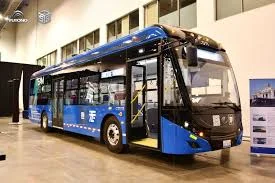 Lagos has officially rolled out its first fleet of eco-friendly electric buses, marking a significant step toward sustainable public transportation in Nigeria’s busiest city. The introduction of these electric buses is part of the Lagos State Government’s broader commitment to reducing carbon emissions and promoting cleaner, more efficient urban transport solutions.
Lagos has officially rolled out its first fleet of eco-friendly electric buses, marking a significant step toward sustainable public transportation in Nigeria’s busiest city. The introduction of these electric buses is part of the Lagos State Government’s broader commitment to reducing carbon emissions and promoting cleaner, more efficient urban transport solutions.
The electric buses, which were launched during a public ceremony attended by key government officials and industry stakeholders, will initially operate along select routes within the city. They are powered by lithium-ion batteries and produce zero emissions, making them a green alternative to traditional diesel-powered buses. The electric buses also promise to offer a quieter and smoother ride for passengers.
Speaking at the launch, Lagos State Governor, Babajide Sanwo-Olu, expressed enthusiasm about the project, highlighting its environmental and economic benefits. “The introduction of electric buses is a crucial step in our efforts to modernize Lagos’ public transport system. Not only will it reduce our carbon footprint, but it will also offer a more efficient, reliable, and cost-effective transport option for Lagosians,” Sanwo-Olu said.
The electric bus project is a collaboration between the Lagos Metropolitan Area Transport Authority (LAMATA) and Oando Clean Energy Limited, which provided the vehicles. The buses have a range of approximately 250 kilometers on a full charge, allowing them to operate for an entire day without the need for recharging. Charging stations have been set up at strategic points along the routes to ensure seamless operation.
With Lagos being one of the most congested cities in Africa, the introduction of electric buses is seen as a potential game-changer in reducing traffic-related air pollution and improving overall public health. The city is home to over 20 million residents, and the transport sector is one of the largest contributors to pollution. By switching to electric vehicles, Lagos aims to mitigate the adverse environmental impacts caused by its bustling transportation network.
According to LAMATA’s Managing Director, Abimbola Akinajo, the electric bus project is only the beginning. “We plan to scale up the deployment of electric buses across all major routes in Lagos. Our vision is to create a modern, green public transport system that benefits both the environment and the people,” Akinajo noted.
Industry experts have praised the initiative, noting that it aligns with global efforts to adopt more sustainable transportation options. The project is also expected to inspire other cities in Nigeria and across Africa to consider electric vehicles as a viable solution to their public transport challenges.



















